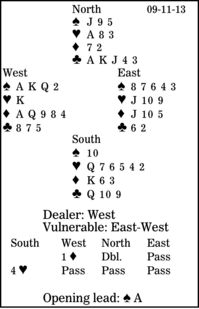Bridge column, September 11: Try to anticipate the unusual

Bridge players take great pleasure in making a contract after correctly anticipating trouble in the form of unfavorable distribution. In today's deal, South is in four hearts. West leads the spade ace and continues with the spade queen. After ruffing, how should declarer continue?
North's takeout double was flexible, unlike a two-club overcall. Also, note South's jump to four hearts. This showed a relatively weak hand with a lot of hearts. With a very strong hand, South would have started with a two-diamond cue-bid
South hopes to take five hearts and five clubs. But he must realize that he might first concede one spade, one heart and two diamonds. However, he can lose two diamonds only if East gains the lead. Declarer must work to stop East from winning a trick.
So, at trick three, when South leads a low heart from his hand, he should anticipate West's playing the king. And if he does, South must go low from the dummy, letting West take the trick. Then everything is under control.
Finally, if you would have bid (a very risky) one spade with that East hand over North's double, you would have reached four spades, which cannot be defeated. Also, if West doubles over four hearts, East might advance to four spades. (Rebidding four spades over four hearts is debatable, being less flexible than doubling.) Once again, bridge is a bidder's game.
** ** **
COPYRIGHT: 2013, UNITED FEATURE SYNDICATE
DISTRIBUTED BY UNIVERSAL UCLICK FOR UFS

